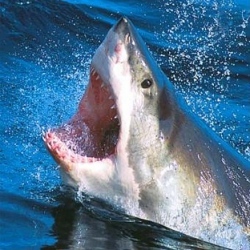
Sharks have patrolled the oceans for at least 400 million years and evolved into a huge range of species. There are deep sea lantern sharks that glow in the dark, wobbegong sharks that grow shaggy beards, and majestic whale sharks, the biggest fish in the sea. But when many people think of these animals, one thing comes to mind: shark attacks.
As a beachgoer, diver or surfer your chances of encountering a shark, let alone being killed by one, are in fact incredibly slim; lightning strikes, bee stings and car accidents all pose far more of a threat than sharks.
In reality, people kill millions more sharks than sharks kill people. A quarter of all shark species, and their relatives the rays, are threatened with extinction, according to a recent report from the International Union for the Conservation of Nature (IUCN).
The main threat to sharks is overfishing and in greatest peril are the largest species. But a controversial cull of sharks was recently ordered in Western Australia following a spate of attacks. Scientists are now looking at other approaches to deal with the shark attack issue.
Prof Shaun Collin is leading a University of Western Australia (UWA) team of neurobiologists who are learning to think like sharks.
